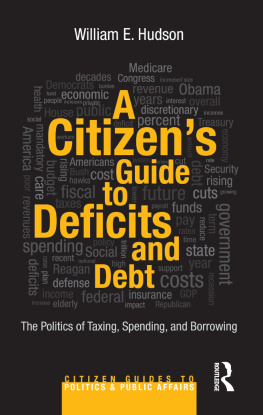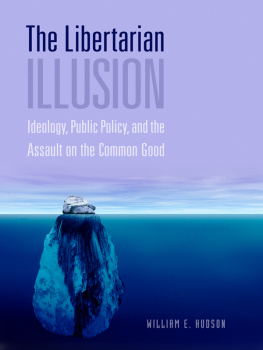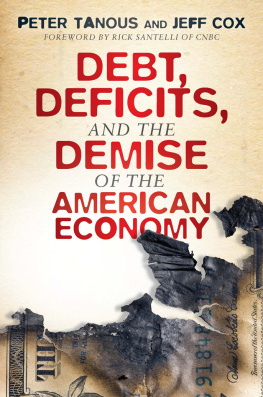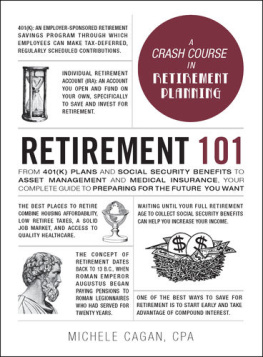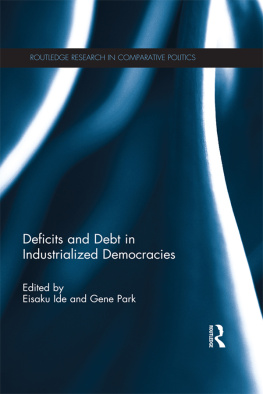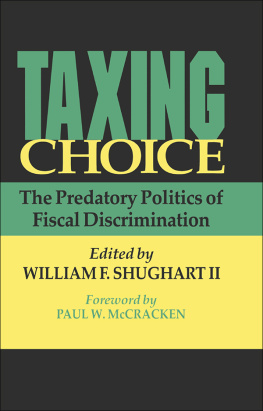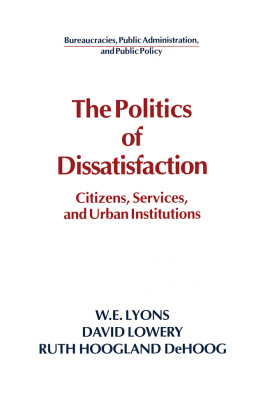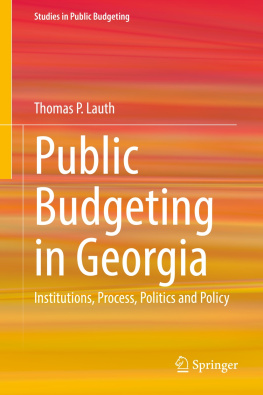A CITIZENS GUIDE TO DEFICITS AND DEBT
America is currently involved in one of the worst economic crises of modern times. As alarm increases over how the government will balance the budget, handle the debt, and maintain prosperity for the future, the minutia of debts and deficits remains incomprehensible to many. Why is it so hard to find ways to resolve the fiscal crisis? This brief and intelligible book is a guide to understanding both the difficulties involved in managing the federal budget and why the on-going fiscal crisis is so significant for Americas future.
In order to introduce the reader to the basic composition of federal spending and to the ways that the government raises revenue, Hudson begins his guide with a map clarifying how to navigate the federal budget. He defines basic financial vocabulary and outlines concepts by using clear charts and diagrams that both provide basis for discussion and illustrate key points. With this budget map in mind, the second part of the book lays out how the partisan divide in America helps explain the fiscal crisis. Hudson analyzes the debate on the extent of the fiscal crisis, the ways that political parties have tried to solve it, and the political events and institutions that have surrounded the crisis.
This citizens guide reveals how differing views of America inform the arguments over deficits and debt. By the time readers finish the book, they will understand that the conflict over deficits and debt is not simply about where to cut or add spending, but instead is a struggle over national priorities and visions for the future.
William E. Hudson is professor of political science at Providence College. He is the author of American Democracy in Peril 7th ed., The Libertarian Illusion and Experiencing Citizenship: Concepts and Models for Service-Learning in Political Science (with Richard Battistoni). Hudson has published numerous articles on public policy issues in journals such as Political Science Quarterly, Polity, Western Political Quarterly, Economic Development Quarterly, and Policy Studies Journal.
CITIZEN GUIDES TO POLITICS AND PUBLIC AFFAIRS
Morgan Marietta and Bert Rockman, Series Editors
Each book in this series is framed around a significant but not well-understood subject that is integral to citizensboth students and the general publicfull understanding of politics and participation in public affairs. In accessible language, these titles provide readers with the tools for understanding the root issues in political life. Individual volumes are brief and engaging, written in short, readable chapters without extensive citations or footnoting. Together they are part of an essential library to equip us all for fuller engagement with the issues of our times.
TITLES IN THE SERIES
A Citizens Guide to American Ideology: Conservatism and Liberalism in Contemporary Politics
Morgan Marietta
A Citizens Guide to the Constitution and the Supreme Court: Constitutional Conflict in American Politics
Morgan Marietta
A Citizens Guide to American Foreign Policy: Tragic Choices and the Limits of Rationality
David Patrick Houghton
A Citizens Guide to Deficits and Debt: The Politics of Taxing, Spending, and Borrowing
William E. Hudson
A Citizens Guide to Terrorism and Counterterrorism
Christopher C. Harmon
A CITIZENS GUIDE TO DEFICITS AND DEBT
The Politics of Taxing, Spending, and Borrowing
William E. Hudson
First published 2014
by Routledge
711 Third Avenue, New York, NY 10017
and by Routledge
2 Park Square, Milton Park, Abingdon, Oxon OX14 4RN
Routledge is an imprint of the Taylor & Francis Group, an informa business
2014 Taylor & Francis
The right of William E. Hudson to be identified as author of this work has been asserted by him in accordance with sections 77 and 78 of the Copyright, Designs and Patents Act 1988.
All rights reserved. No part of this book may be reprinted or reproduced or utilised in any form or by any electronic, mechanical, or other means, now known or hereafter invented, including photocopying and recording, or in any information storage or retrieval system, without permission in writing from the publishers.
Trademark notice: Product or corporate names may be trademarks or registered trademarks, and are used only for identification and explanation without intent to infringe.
Library of Congress Cataloging in Publication Data
Hudson, William E., 1948
A citizens guide to deficits and debt: the politics of taxing, spending, and borrowing / by William E. Hudson.
pages cm. (Citizen guides to politics and public affairs)
Includes bibliographical references and index.
1. Finance, PublicUnited States. 2. Government spending policyUnited States. 3. Fiscal policyUnited States. 4. United StatesEconomic policy2009 5. United StatesEconomic policy2009 I. Title.
HJ257.3.H83 2013
336.73dc23
2013025246
ISBN: 978-0-415-64460-0 (hbk)
ISBN: 978-0-415-64461-7 (pbk)
ISBN: 978-0-203-07944-7 (ebk)
Typeset in Garamond
by EvS Communication Networx, Inc.
FOR MY CAPSTONE SEMINAR STUDENTS
AND
LORET, ONCE AGAIN
CONTENTS
MORGAN MARIETTA AND BERT ROCKMAN
PART I
The Shape of the Federal Budget
PART II
The Politics of Deficits and Debt
The national debt remains one of our most confusing and intractable political debates. Few citizens can truly claim to understand all of its aspects. Why is the debt bad for the economy? Why has it accumulated to such heights and why is it so hard to control? Why have our leaders positions become so entrenched to the point of stalemate? And what is the likely future of the debt struggle? These questions are answered in clear terms by William Hudson, the Director of Public Administration and Professor of Political Science at Providence College. Author of a popular textbook on American politics (American Democracy in Peril, now in its 7th edition), Professor Hudson specializes in the analysis and critique of national policies on economic development, taxation, and social welfare, always from the perspective of citizen engagement in our democracy. He employs his experience in teaching these difficult concepts to dispel the confusion about deficits, debt ceilings, sequestration, and the misnamed mandatory versus discretionary spending. Professor Hudson addresses the trade-offs involved in removing various pieces of federal spending that contribute to the national debt, forcing us to examine what is truly at stake and what choices must be made. Contrary to much of the current conversation by our elected leaders, this volume explains why we cannot rely on small reductions in discretionary spending, but must reform the large entitlement programs like Social Security and Medicare as well as re-evaluate our current tax policies if we are to make meaningful changes in the economics of the growing debt.
Perhaps most importantly, Hudson argues that the debates over the national debt are really reflections of a larger conflict over competing visions of Americas future. The debt is a master issue that encompasses many smaller conflicts about health care, defense spending, welfare reform, fair levels of taxation, and a host of other public problems that all revolve around the allocation of dollars. Each of these individual questions add up to the largest and most daunting one: What do we really care about as a society? Hudson reveals the competing visions of what Americans should and should not value, reflected in the politics of taxing, spending, and borrowing. The volume explains why we must face these choices about our national priorities, with full knowledge of their true costs and consequences. The era of easy decisions is over. In a time when we can no longer maintain current levels of spending and current levels of taxation along with the old habits of avoiding hard choices, Hudsons


